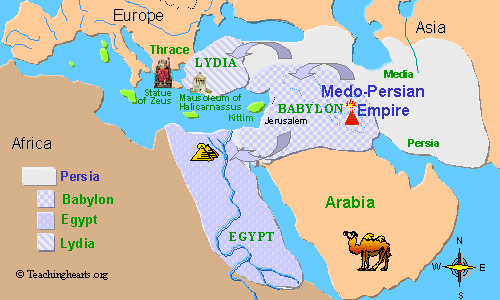To recap:
I. Titles: Indeterminate
A. Antioch is the Church "of all the East". But Jerusalem is in the East.
B. Jerusalem is the Church of "Arabia Beyond the Jordan". But Antioch's claim to "Arabia" blocks it from going very past the Jordan. Baghdad is beyond the Jordan and under Antioch too.
II. Chalcedon giving "Arabia" to Antioch: Favors Antioch
A. Antioch and Jerusalem both find historical ownership of "Arabia" crucial.
B. Arabia in Latin and in the Bible typically refers to Arabia like it does in English.
C. Chalcedon gave the three provinces of Palestine to Jerusalem. So it could mean the
province of Arabia. But the province of Arabia did not have a set eastern border and Rome kept trying to claim the rest of Arabia. The bishop who gets the province of Arabia likely gets the Christians in Arabia in general, just as the bishop of Britannia gets Britannia's Christians.
III. Chain of Possession: Favors Antioch
A. Qatar had an Orthodox bishop under Antioch in 410, and there was no agreement that it would switch to Jerusalem.
B. Qatar's Christians became Oriental and/or Nestorian, but they still considered themselves under Antioch, and continued to have bishops in Qatar, like one in 575. Oriental Orthodox have parishes in Bahrain and Qatar.
C. St. Isaac of Syria, the 7th century Orthodox bishop of Nineveh was from Qatar and remained closely associated with it.
D. Antioch remained the Patriarchate for parishes in the Sassanid kingdom, which covered Qatar.
E. Met. Constantine under Antioch made parishes in neighboring Oman and Bahrain 50 miles from Qatar in the last 15 years. Thus on either side of Qatar there were Antiochian parishes.
F. 3-4 years ago Jerusalem made a parish in Qatar, but making a new parish does not void previous claims by Antioch.
IV: Nationality: Weakly Favors Antioch
A. Qatars are Arabs, like the Patriarchate of Antioch. But this is not a decisive factor, as Jerusalem's parishioners are half Arab themselves and Jerusalem has a Arabic bishop.
VI: Proximity: Favors Antioch
Jerusalem recognizes the bishop of Kuwait to be under Antioch, and Qatar is far closer to Kuwait than to Jerusalem, or many other Orthodox sees, for that matter.
Notes:
Metr. Constantine [of Baghdad under Antioch] established a number of Orthodox parishes within the Arabian Gulf area, first in 1980 in Dubai and Abu Dhabi. Then in 1998, he established a parish in Oman, followed in 2000 with one in Bahrain.
Constantine (Papastephanou) of Baghdad - OrthodoxWiki
Antioch's letter comments about the 3 years' stay in Qatar by Jerusalem:
We are grateful that Archimandrite Makarios provided all necessary pastoral care to this particular parish, but it was a temporary arrangement to facilitate this pastoral activity, no more and no less.
Considering these factors, Qatar should go to Antioch because it's in Arabia geographically, Orthodox there have been under Antioch at least until the splits with eastern churches, Antioch's parishes included Persia, which covered Qatar, the nonOrthodox still consider themselves under Antioch's domain, it was never explicitly given to Jerusalem although it did belong to Antioch at one point, the nearest agreed-on See belongs to Antioch, and it was surrounded on both sides by Antiochian parishes when Jerusalem moved in.
The alternative would mean that a bishop's territory did not extend outside Roman control of that territory's province, that Rome did not lay any claim to Qatar for its province of Arabia, if the nonOrthodox of Qatar reunite they would not go under the Patriarchate that they claim to, and if a patriarchate's land becomes vacant for some reason then another patriarchate can claim it based on that fact.
Not only do the reasons to give it to Antioch make sense, but the alternative is very doubtful.

